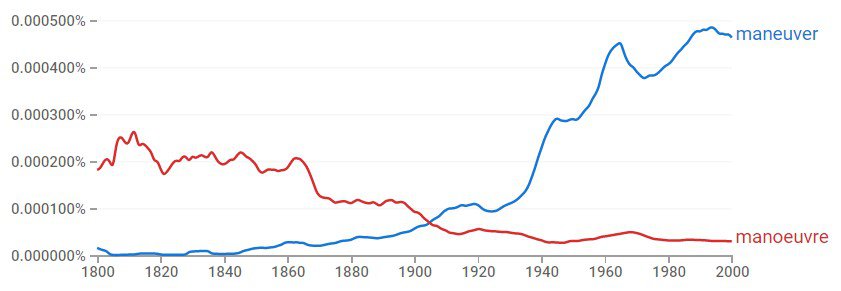In American English, maneuver is the standard spelling of the word referring to (among other things) a controlled change in movement or direction. Manoeuvre is the preferred spelling throughout the rest of the English-speaking world. Maneuver and manoeuvre are pronounced the same, and they share all their definitions.
A few scattered examples of maneuver can be found from as long ago as the 18th century, before the development of American English as we know it, but manoeuvre prevailed by a large margin until the early 20th century. The ngram below, which graphs the use of both spellings in American books published between 1800 and 2019, suggests that the transition to the simpler spelling gained steam through the 1910s and ’20s and was solidified by 1940.

A similar ngram for British English shows maneuver beginning to gain ground in recent decades, but manoeuvre still prevails. This is borne out in recent British news stories, where the ratio of manoeuvre to maneuver is about 30 to one.
Examples
U.S.
The flag requires 50 adults—or very strong teenagers—to maneuver the poles of the flag and hold them steady for the parade. [Chicago Sun-Times]
Then he opened the door, nimbly maneuvered his 6-foot-5 frame over his belted-in son and settled into the bucket seat between his children. [Wall Street Journal]
Mr. Chiluba cycled through vice presidents and cabinet members he suspected of maneuvering to take his power. [Washington Post]
Outside the U.S.
Prince William will help perform the daring manoeuvre of landing a helicopter on water during the royal visit to Canada. [Evening Standard]
Collingwood coach Mick Malthouse said he manoeuvred to make sure no one player copped too prolonged a buffeting. [Sydney Morning Herald]
Certainly Clark must see that this is obviously political manoeuvring to get her elected. [Vancouver Sun]
Comments are closed.